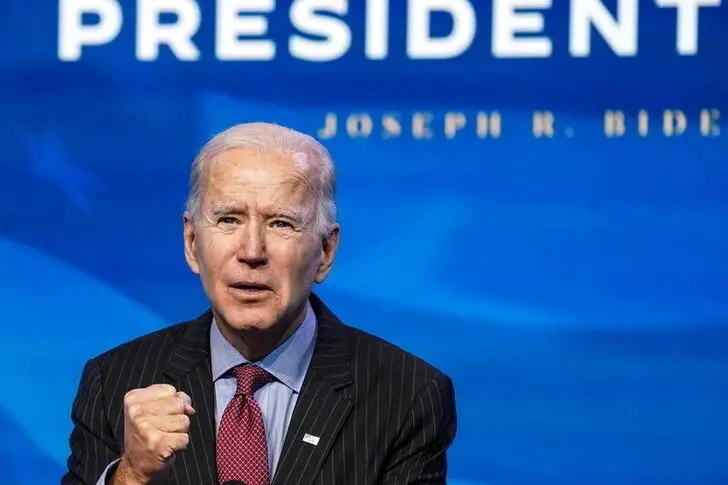PHOTO
The past four years have demonstrated that when the US disregards mechanisms of international justice, such mechanisms effectively cease to exist: Systematic human rights abuses have been perpetrated with impunity, predatory nations have sought to seize territories from nearby failing states, and multilateral efforts to address conflicts like Syria ran into the sand. Vladimir Putin has now followed Donald Trump in withdrawing from the Open Skies Treaty, just one of a succession of accords that were supposed to make the world safer but have been consigned to the bonfire since 2016.
Meanwhile, the sitting US president has been indicted for “incitement to insurrection” against his own Congress. The Capitol riot inspired undisguised joy from states such as Iran, Russia, Venezuela, Turkey and China. Several Congressmen themselves may now face legal consequences for facilitating the riot, and many of the Republican Party’s largest corporate donors have severed ties.
While NATO allies will be relieved at America’s return to the international fold, the Trump years of unilaterally abrogating treaties, defunding and undermining international bodies, and unpredictable policy U-turns have done lasting damage to America’s international moral standing. Given the possibility that American voters could elect another such maverick in future, other Western states are developing defense and foreign policy mechanisms less reliant on the US.
The Biden presidency will prioritize the re-establishment of America’s role in the world. Biden’s incoming team, including high-caliber figures such as Antony Blinken and William Burns, are the complete opposite of Trump’s appointees — methodical, career diplomats, known to be safe and experienced pairs of hands. These officials are strong believers in America’s global leadership role, as well as the necessity of acting closely with international allies.
We are already seeing various authoritarian figures such as Turkish President Recep Tayyip Erdogan rushing through a number of political changes designed to reduce likely frictions with the Biden administration, including efforts to improve relations with Israel and Europe. Biden previously characterized Erdogan as an "autocrat" who must "pay a price" for his policies, pledged to recognize the Armenian genocide, and urged support for Turkish oppositionists. It’s easy to see why Erdogan is so worried.
Regarding China, Biden’s approach isn’t likely to be more confrontational than Trump’s, but there will certainly be a more consistent emphasis on human rights, particularly regarding the Uighurs and Hong Kong. Indian Prime Minister Narendra Modi will also be compelled to rein in human rights abuses against non-Hindu communities if he doesn’t want to find himself ostracized by the incoming US administration.
Most Americans previously took their political system for granted. When Trump came to power it was widely assumed that US democratic institutions were strong enough to restrain his worst impulses. However, these mechanisms have been tested to breaking point, with Trump’s Republican Party enablers often shamelessly facilitating his corrupt attempts to subvert the system.
We have also learned painful lessons about the destabilizing effects of overheated social media forums in a hyper-partisan environment, giving rise to a situation in which about 70 percent of Republican voters believe Trump’s lies that the election was stolen. A huge proportion of the population are living in an alternative reality, where a violent assault on the Capitol building to subvert the election results can look like patriotism. We are used to seeing presidential candidates refusing to concede or trying to falsify results in African and Asian elections, but we aren’t accustomed to witnessing this from the US.
Data from Freedom House suggests that in every year for the past decade democracy around the world has moved backwards, with growing numbers of states trending toward autocracy and declining standards of governance, coinciding with growing numbers of fragile and disintegrating states. This is likewise correlated with yawning social inequalities between increasingly impoverished populations and hyper-wealthy oligarchies who monopolize governing systems in order to perpetuate their own wealth.
In many parts of the world it is becoming the norm that whoever wins power will work to subvert institutions and the media in order to retain power indefinitely. Putin can now potentially remain in power until 2036. Constitutions are only pieces of paper, and civil society has often proved too weak to fight back.
Such is the crisis of global governance and leadership in 2021 that it’s difficult to see how the international community can stop the rot, when even the European Union has proved tragically impotent in challenging misgovernance among its own members, such as Hungary and Poland. It is certainly far easier to dismantle and throttle a governing system than it is to rebuild norms of effective governance.
The ascendancy of the Biden administration represents a new era of multilateralism, but immense efforts will be required if this is to result in improved global leadership, more resilient states, and a renaissance for international institutions. Let’s not forget that China and Russia had already turned global bodies such as the UN Security Council into meaningless talking shops long before Trump.
The world has witnessed more than enough of right-wing populism. The smooth running of Western democracy has habitually been premised on the good intentions and integrity of civil servants and political parties. This has been demonstrated to be dangerously insufficient. From Biden, the EU and elsewhere there will need to be a raft of new legislative measures to further protect governance mechanisms, irrespective of who captures the levers of government. Failure to do so will have catastrophic implications for social cohesion and world peace.
- Baria Alamuddin is an award-winning journalist and broadcaster in the Middle East and the UK. She is editor of the Media Services Syndicate and has interviewed numerous heads of state.
Copyright: Arab News © 2021 All rights reserved. Provided by SyndiGate Media Inc. (Syndigate.info).





















